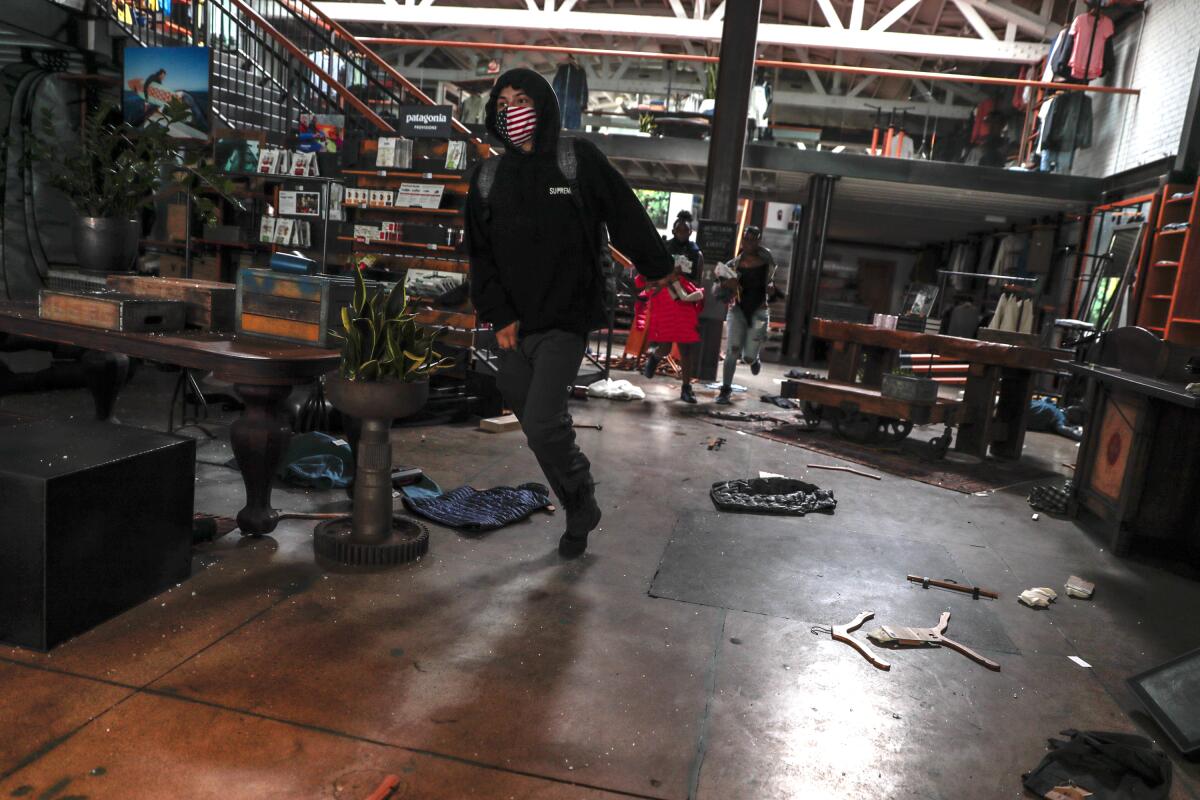Santa Monica police chief retires amid furor over her handling of summer protests

During the summer’s protests against police brutality, Santa Monica Police Chief Cynthia Renaud came under withering criticism.
Some lambasted her for allowing the vandalism of businesses to go unchecked, others for cracking down on peaceful demonstrators.
When Renaud and the city’s then-mayor took a knee, calling for peace, the move was derided as a photo op.
From the law-and-order side, more than 66,000 people signed a petition criticizing her weak leadership and calling for her removal.
Last Friday, Renaud satisfied her detractors by retiring.
She will still have an influential voice at a volatile moment in American policing as the recently elected president of the International Assn. of Police Chiefs.
Interim City Manager Lane Dilg praised Renaud’s accomplishments during her two-year tenure. Crime decreased by 16% in 2019, and Renaud oversaw a shift in resources to address homelessness, Dilg said in a written statement.
”Recognizing that recent events both here in Santa Monica and around the nation have strained community-police relations, Chief Renaud has made the decision to step aside so that the Santa Monica Police Department can continue to move forward,” the statement said.
Renaud was a police officer in her hometown of Long Beach for two decades before becoming chief in Folsom.
She said she could not speak with a reporter on Thursday because she was attending the annual police chiefs conference and running several workshops as incoming president of the organization, which has 31,000 members worldwide. Leading the IACP comes with a prominent platform, although it is a volunteer position.
“I am proud of our record over the past two years in times of unprecedented scrutiny and challenge for law enforcement,” she said in a written statement. “In my role as President of the IACP, I will be focused on rebuilding the relationships of trust on which all successful law enforcement is based.”
Jacqueline Seabrooks, who led the Santa Monica Police Department for five years, will serve as interim chief.
As civil unrest ignited throughout the country after the killing of a Black man, George Floyd, by Minneapolis police, some protesters focused on wealthy areas like Santa Monica.
Live television cameras captured stores being ransacked with no police officers in sight. Elsewhere in the city, officers arrested more than 400 protesters, most of them peaceful, and fired rubberized bullets into the crowds. Officials imposed a citywide curfew, and National Guard troops patrolled the streets.
An outside watchdog has been hired by the city to investigate the Police Department’s handling of the protests, which began May 31 and continued for weeks.
Renaud becomes the first police chief in the Los Angeles region to depart in the aftermath of the summer’s unrest. But others, including Los Angeles Police Chief Michel Moore, have come under similar scrutiny for failing to protect businesses while employing heavy-handed tactics against demonstrators.
Nationwide, the chiefs of Seattle, Dallas and Rochester, N.Y., all quit amid battles over protest response and police budgets.
The City Council on Saturday approved four months of severance pay for Renaud, a total of about $97,000. Renaud’s annual salary was $290,916, not including benefits.
The city provides a four-month severance for most executives who are terminated involuntarily. Dilg told the Santa Monica Mirror that Renaud’s departure was a “mutually agreed-upon retirement.”
But Renaud received the severance anyway, to ensure “a smooth and positive transition of duties in this highly sensitive and very important role,” Dilg said.
Under her retirement agreement, Renaud must provide materials requested by city officials or outside investigators looking into the department’s handling of the protests.
In a lengthy Facebook post defending her decisions, Renaud said that on May 31, she deployed five times as many officers as on a normal Sunday in anticipation of a protest at Ocean and Montana avenues.
Once the scale of the protest became clear, she activated the entire department and requested aid from neighboring law enforcement agencies.
Officers were trying to calm a crowd that was throwing rocks and bottles at the pier and were also protecting businesses on the Third Street Promenade, so they were unable to respond as vandalism escalated on 4th Street, she wrote.
“My first responsibility is to protect the lives of people in our community, and on Sunday, my priority was the preservation of life and protection of the city,” she wrote.
At a news conference on June 1, Renaud said “opportunists” had taken advantage of peaceful protests to descend on the city, “knowing that resources will be tied up in ensuring 1st Amendment rights to free speech.” She said most of the people arrested were not Santa Monica residents.
Seabrooks was Santa Monica’s first Black female police officer, rising through the ranks for 25 years before becoming chief in Inglewood. She returned to lead the Santa Monica Police Department, which has about 220 sworn officers, from 2012 to 2017.
According to Seabrooks’ LinkedIn profile, she is now a law student at the University of North Texas in Dallas.
“I am certainly humbled at being asked to once again serve the Santa Monica community,” Seabrooks said. “I am equally excited to begin working alongside the women and men of the Santa Monica Police Department as we continue to focus our attention on all facets of community safety during these unprecedented times.”
More to Read
Sign up for Essential California
The most important California stories and recommendations in your inbox every morning.
You may occasionally receive promotional content from the Los Angeles Times.











